Top 10 Films that Deviated from the Book (But Turned Out Great!)
I’ve heard a lot of people say lines like “the book’s always better” or that a film adaptation of a book is awful because they changed too much. I’ve never really gotten into that idea; I kind of think it rather regulates the idea that a filmmaker can put their own spin on a work. After all, if you’re going just adapt the work wholesale, what’s the point of adapting it at all? Filmmakers have a real issue when adapting other people’s work. In this sense, they’re adapting for a new medium with film now being a visual language. There’s also a point where you have to take what was a really long story that can be as long as the author intends to an environment where you are only allowed to have your story go on for two and half hours, three absolute max. And let’s face it – those don’t often happen for films based on books not called Lord of The Rings! So, taking that into account, I kind of wanted to look into the idea of what films really worked where they either flat out ignored the book or made fundamental changes, so much so that the film and the book were almost two separate entities. Now, for this list, the book doesn’t have to be wholly ignored – the film can still borrow the book’s core plot, themes, characters etc. etc. but the changes made to the film version have to substantially change the story in several ways, be it a setting change; character changes; you get the idea. This also wasn’t done fundamentally on a ratio of how good the film is to how much it was changed from the book since that was going to overcomplicate things and the list kept changing back and forth. So, I took 10 examples from a list that I made and simply ranked them in the order of how much I enjoyed the film version. But I also picked all these because I think the book is well worth picking up as well, with a few exceptions where I think the films fundamentally improved on their books, and one of them is probably going to make me an enemy of a few people. So, without further ado, let’s get into the top 10 list.
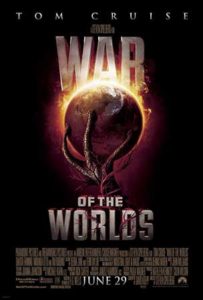 10. War of The Worlds (2005)
10. War of The Worlds (2005)
based on the book ‘War of The Worlds’ by H.G. Wells
H.G. Wells’ War of The Worlds has fundamentally been adapted several times but there’s rarely been a straight up adaptation of the book outside of one example I could find which was an incredibly low budget independent film that’s really not worth a watch. Steven Spielberg’s 2005 film is following quite a lot of portions of the book but it is hard to ignore that it can never fully be an adaptation of its book given that it’s set in the mid-2000s from a book that was set in what was the late 1800s. It also kind of ditches the colonialism message of the book in favour of being a commentary on American attitudes post-9/11. In fact, 9/11-like imagery is used quite a lot in this film. It was actually rather bold considering this was coming out only four years after the events of 9/11. Now, as for the film itself, I actually think this is quite good on several levels. Tom Cruise’s performance is actually really good in this film and I think the direction is really well done – Spielberg really applied himself with this film. And I think some of the changes make a lot of sense, such as that the main character trying to protect his brother and wife is now changed to an estranged father protecting his children actually lines up more closely with what we’d expect, and as a result, it does a very good job of what we’d expect in a modern setting and it does a pretty good job accurately giving an idea of what an alien invasion would feel like in the mid-2000s. I wouldn’t say it’s for everyone. It actually does feel a bit like a mean-spirited dig at the film Independence Day, though for more information on that I would direct you to Lindsay Ellis’ video on the both the film which examines the portrayal of alien invasions in a pre-9/11 and post-9/11 environment. If you haven’t seen this version of War of The Worlds and are opposed to the idea of it because it’s got a modern setting, I’d urge you to reconsider. I think you will get an excellent film out of it.
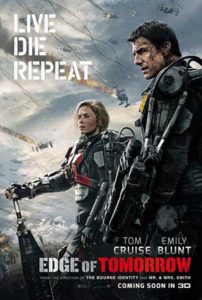 9. Edge of Tomorrow (2014)
9. Edge of Tomorrow (2014)
based on the book ‘All You Need Is Kill’ by Hiroshi Sakurazaka
At least I think it’s called Edge of Tomorrow – they seem to keep changing the title every time I go into a DVD shop. Some DVDs call it Live, Die, Repeat. And it really baffles me on several levels why they didn’t just call this film All You Need Is Kill outside of Japan. This once again is a cultural change setting that also stars Tom Cruise but this time it’s moved from a Japanese setting to an American character in a European setting. Now, the creatures do behave similarly to how they do in the book, but the fact of the matter still remains – it’s not just the setting which was fundamentally changed. There were also several facts surrounding the characters as well as how the action plays out and even the fact of the conclusions which are fundamentally different between them. While both the film and the book set up for sequels down the line – neither of which have happened at this point in either case – it doesn’t change the fact that the film version does feel tonally very different to that of its book. That being said however, Edge of Tomorrow (or Live, Die, Repeat) is one of my favourite sci-fi films of the previous decade; I really liked this one when it came out. I really went into this one thinking it was going to be a really mindless alien action film, but it does an excellent job. Tom Cruise gives a brilliant performance, being well against type-cast this time as a rather reluctant, inexperienced soldier who’s been fast-tracked up and is not prepared for a real battle situation, and Emily Blunt’s action turn is actually really phenomenal. And the action scenes? Really excellent. The whole you-repeat-the-day-after-you-die-and-keep-going mechanic is used in several creative ways, and I’d really urge you to give this one a go. It’s really excellent.
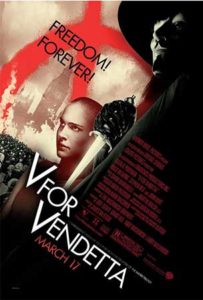 8. V For Vendetta
8. V For Vendetta
based on ‘V For Vendetta’ by Alan Moore
V For Vendetta is probably the best of all the graphic novels that got turned into films but considering the competition including Zack Snyder’s terrible Watchmen adaptation which is very loyal to the graphic novel in terms of its plot but tonally missed several of the points. And also, the abysmal League Of Extraordinary Gentleman, a film so bad it caused Sean Connery to retire from filmmaking for nearly a decade. V For Vendetta didn’t exactly have a high bar to leap over. That being said, as much as people have pointed out that V For Vendetta is vastly different in several regards to its graphic novel and it’s a pretty fair judgement; there’s a lot of changes between the two versions. I think both the film and the graphic novel are excellent pieces of work. The film version, while deviating quite heavily from its comic, is still excellent. It dives into a lot of the core themes of the graphic novel so that it doesn’t feel entirely separate. You have excellent performances from actors like Hugo Weaving, Natalie Portman, John Hurt and even some of the smaller roles were excellently done, including the noteworthy performance of Stephen Fry of playing, well, Stephen Fry, which resulted in him getting tons of questions about the similarities between the film and the election of Donald Trump in virtually every interview he was in since people happened to remember he was in this film. Alan Moore took a lot of exception to it because he felt the film didn’t talk enough about fascism which was what he was directly going for in the novel which is certainly not an unfair comparison but I don’t think a film actually has to use the word fascism to talk about it. The film still does an excellent job portraying a Britain that has quite happily given away its freedoms in the name of security. The inciting incident to both of those is one of the more changed elements of each version, and while V For Vendetta has arisen several people using the imagery of that film in rather annoying ways which show that they really didn’t quite get the film and what it was going for, I still think the film is utterly excellent – it’s really worth a watch if you haven’t seen it yet.
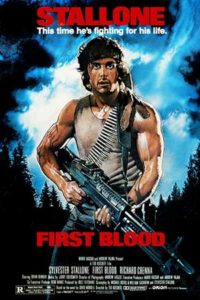 7. First Blood (1982)
7. First Blood (1982)
based on the book ‘First Blood’ by David Morrell
The first Rambo movie is something to really behold. It’s actually a lot better than I think a lot of people gave it credit for. Now, David Morrell’s real book and the film both deal with the idea of a Vietnam veteran coming home to a less than warm welcome and while, yeah, from what I’ve gathered the book version is way more subtle than the other version and Morrel’s original intention was to create a book where you would change your mind over who was a hero and who was the villain. The film version really doesn’t have that. There’s a lot of differences between the book and film including the fact that Rambo is a lot more violent in the book version and has a much higher body count. Yeah, the film is less violent than the book! I’ll let that sink in for a moment. But there’s also a lot of other changes, to such an extent that in most versions of the book, you now get a mini-prologue chapter where Morrell talks about his opinion on both the book and the film and how they’ve become separate entities. Though, I think if you want to look even more into the differences between the two, I’d highly recommend Dominic Noble’s Lost in Adaptation episode. It’s a really excellent dive into the differences between the book and the film. Now, that being said, First Blood is still an excellent film in its own right. It was one of Sylvester Stallone’s starring performances and rightfully so. Rambo was probably never better written than he was in this film. When I reviewed Last Blood last year, I talked about how First Blood was one of my favourite action films from that era and I stand by it; it’s really excellent. And the fact that the change is fundamentally different from the book also really doesn’t bother me. I actually think the film version puts the audience in a more intentionally uncomfortable position and it actually feels like Rambo has more layers in the film than he does in several regards in the book. It’s really worth a watch and a read; I think this one should be talked about more often in regard to the changes from its book.
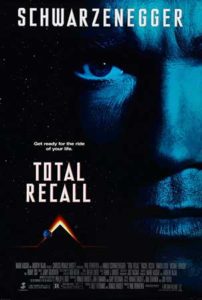 6. Total Recall (1990)
6. Total Recall (1990)
based on the book ‘We Can Remember It for You Wholesale’ by Philip K Dick
Yeah, none of Philip K Dick’s books ever really got faithful adaptations. I’ve heard some people say that A Scanner Darkly is rather close to its book counterpart but I’m unaware of the changes between those two so I can’t verify that. I could have highlighted Blade Runner again but I already did that last week so I’m going to highlight another Philip K Dick adaptation that I really like. And I’m talking about the 1990 film starring Arnold Schwarzenegger not the terrible remake starring Colin Farrell. Total Recall is very different in several regards. It actually kind of feels like it’s a joke on the book. The film does feel like a simple, really well-done Arnold Schwarzenegger action film but Arnold Schwarzenegger’s casting was very deliberate and ties very much into the film’s core idea and, without giving too much away for people that haven’t seen this film, adds an extra layer that wasn’t there in the book and really makes this film beyond cool. This is one amazing sci-fi film. You have excellent if hammy performances and it’s a film that will be open for endless interpretation for years to come. The Mars setting also kind of feels like a joke from the book since that was part of what the main character’s recall appointment was about in that scenario, but that being said, I really thought they did a brilliant job with taking the book and doing something very interesting with its premise, even if the film has now really become its own thing to such an extent that when We Can Remember It For You Wholesale was adapted again, it wasn’t an adaptation of the book – the next Total Recall would be completely a remake of Total Recall. But damn, that film sucked!
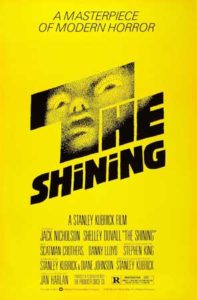 5. The Shining (1980)
5. The Shining (1980)
based on the book ‘The Shining’ by Stephen King
Okay, here’s where I’m going to make an enemy. I’ve stated in the past that I’ve not been a big fan of Stephen King and frankly The Shining is why. The fact he complained about the film adaptation of his book really seems weird to me since, from my point of view, Stanley Kubrick took a book that was not very frightening and made it frightening. The Shining film version is an excellent dive into isolation and the fear of being stuck in an environment with someone who could turn around and kill you any second, with one of Jack Nicholson’s most frightening performances. Now, the biggest complaint King had with this film was the fact that Jack wasn’t as sympathetic as he is in the book which I agree with, I think there could have been more of a dive into his character, but I think that also would have made the film a little less frightening. Oh, and while we’re at it, the book brings in a bunch of things which really are not as scary as Stephen King thinks they are including the hedge animals that come to life and the weird amount of use of wasps. But the thing is, if you really want proof of how iconic The Shining film version really is, most of the great moments of that film were additions made for the film – “all work and no play make Jack a dull boy”; the blood elevator; the weird scene involving the guy in the bunny costume – they weren’t in the book. If you want to see a film version that’s accurate to the book check out the TV miniseries, but that TV miniseries is so fundamentally the book it’s to a fault since it hasn’t accounted for the fact that, as I mentioned, film is a visual language. Stephen King has really had trouble getting faithful adaptations of his work out without executive producing since most of the adaptations make fundamental changes (the good ones, anyway, that are not called Shawshank Redemption). But I really would recommend checking out The Shining if you haven’t already.
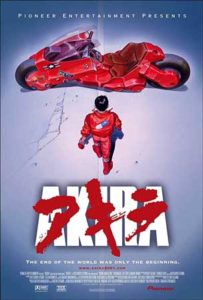 4. Akira (1988)
4. Akira (1988)
based on the book ‘Akira’ by Katsuhiro Otomo
Yeah, I talked about Akira two weeks in a row but there’s actually a really good reason to talk about Akira since it’s one of the most interesting adaptations I’ve seen. Otomo was the author and artist of the manga Akira, and when it was brought out for adaptation, he was put in charge of both writing and directing the film version. The problem is, well, Akira wasn’t done at the time. Yeah, Akira was only halfway through by the time the film went into production. Otomo had an ending in mind but he couldn’t execute the entirety of his story throughout the film so Otomo has to make this film where he has to follow much of the story that is in his manga but also fundamentally change cuts and splice on the original ending that was planned without a lot of the setup. As a result, the film is really bizarre in how much it deviates in certain regards from the manga and then goes back to the manga later down the line. It sounds like it should be a disaster but yet Otomo found an excellent middle ground to such an extent Akira is very worth a watch – I mean, I recommended it two weeks in a row so that’s got to be saying something. Akira is one of the most aesthetically pleasing films as well as one of the most interesting films in terms of its themes, action, character moments and the sheer level of creativity that they took the animation to bring the manga to life. It almost makes you forgive the fact that several characters from later in the story are pushed away further in and several of the characters that played fundamental roles were cut entirely. And once again, I have to mention that if you’re going to watch Akira, make sure you track down the second dub and not the first one if you want to see the film in the English language – the first one is not that good.
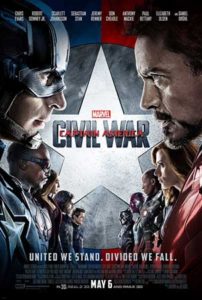 3. Captain America: Civil War (2016)
3. Captain America: Civil War (2016)
based on the book ‘Civil War’ by Mark Miller
I decided that there had to be a Mark Miller graphic novel adaptation for this list since I always find Mark Miller to be the very mean-spirited writer whose work when handed to really good writers and directors actually turn out pretty well. I was really considering choosing at one point between Kick-Ass and Kingsman which are both way better films than they are compared to their graphic novels, even though Kick-Ass actually got a conclusion in the graphic novels and the films will never see that thanks to the fact that hardly anyone went to see Kick-Ass 2, which I’m still bitter about. That film was not as bad as people made it out to be. But then I realised that there was another Mark Miller comic that got turned into a film and is also way better than its counterpart which was the first film of the third phase of the Marvel Cinematic Universe, Captain America: Civil War. This took what was a Marvel event comic and turned it into a Captain America story, though people have said this is basically Avengers 2.5. Here’s where I made an enemy of comic fans: Civil War is a terrible event comic and it feels like everyone’s in denial of this! Look, I respect you if you like Civil War but you have to admit it is not as good as people have made it out to be over the years. If Marvel movies are feelgood events of the summer, Civil War feels like a feel-bad event because it’s – once again, rather like most of Mark Miller’s work – very mean-spirited and also has a terrible ending. Seriously, the effects of that event comic really did a damage to Marvel comics over the years. I was wondering, how the hell are you going to pull this off with a Captain America-centric story? And yet, the Russo brothers direct this film brilliantly. They fundamentally take a story about two idiots that won’t talk to each other, like people who have been friends for years, and create a genuinely interesting dispute over an ethical point which genuinely you could come down both sides on. And because I really like these versions of Iron Man and Captain America, it feels like more a gut punch that we know they’re eventually going to clash. The film starts as an excellent introduction to Spiderman in the Marvel Cinematic Universe and gives all of its characters something excellent to do which, given that the Civil War comic felt like it was almost trying to crowbar-in the characters, is saying a lot. I really commend the Russo brothers with this film. They took what was a graphic novel I really didn’t like and turned it into a film I really love – this is one of the best Marvel films, period.
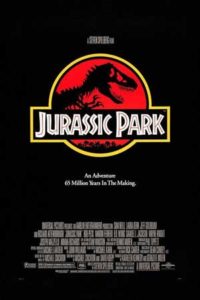 2. Jurassic Park (1993)
2. Jurassic Park (1993)
based on the book ‘Jurassic Park’ by Michael Crichton
This film involved the author in a screenwriting credit. This time though, it wasn’t as if the book wasn’t done. The book was done but Crichton did not lord himself over the production or insist that it just be a version of his book, so as a result the two feel completely different. Some characters that lived in the book die in the film and vice versa. There’s a lot of fundamental changes to the characters to such an extent that for the most part of the film they only really share the names; they don’t share the characteristics or even the looks, considering that Alan Grant is played by Sam Neal in the film and in the book he’s described as a 40-year-old pudgy man with a large beard. That being said however, both stories are excellent – Jurassic Park has become a film standard for a reason. I seriously love this film. Jurassic Park is a pioneering work in film and really stands the test of time. Once again, Steven Spielberg makes the list and really knows what he wants to do. This is him on Blockbuster form, and he wisely made the decision to make the dinosaurs the stars of the show and not the lead actors. Even then, he still manages to get in some of the ethical discussions from the book into the film. So yeah, the two are fundamentally very different even if they are telling similar plots but both are excellent, and I cannot believe it if you’ve gone this long in your life and not seen Jurassic Park.
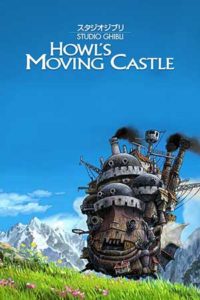 1. Howl’s Moving Castle (2004)
1. Howl’s Moving Castle (2004)
based on the book ‘Howl’s Moving Castle’ by Diana Wynne Jones
Studio Ghibli films have often used European settings and British literature for their source but this was the one time there was a lot of fundamental changes made from the book to the film. Hayao Miyazaki came out of retirement to direct this film, which was originally planned to be directed by Summer Wars, Wolf Children and Boy and The Beast director, Mamoru Hosoda, straight off his success with Digimon. But there were a lot of creative differences backstage which led Miyazaki to come out of retirement to direct the film and he really put a lot more of his own story into this. In fact, the film really is quite loyal up until we get to the halfway point which is when it really starts becoming its own thing. Now, don’t get me wrong, the book is really good and has some cool features to it but I think the film really made some necessary changes and turned out amazingly. I love this film. You have excellent performances in the dubbed version from actors like Christian Bale, probably giving one of his best performances, the late, great Jean Simmons as the older version of Sophie, and of course Billy Crystal’s scene-stealing performances as Calcifer. I really recommend all of Hayao Miyazaki’s films, but I will definitely say that Howl’s Moving Castle is another exceptional film. Yes, there a lot of big changes from the book including several characters like some of Sophie’s sisters being cut form the film version and the anti-war message is pretty much a film exclusive, but it’s a really excellent movie and I really highly recommend you check it out along with the entire Miyazaki filmography and the Studio Ghibli film collection.
Share This Post:


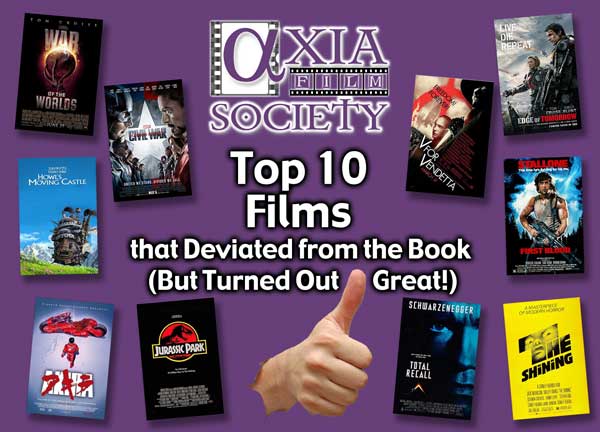





Great list Cal but what about ‘The Woman in Black’?
So many changes from the book!